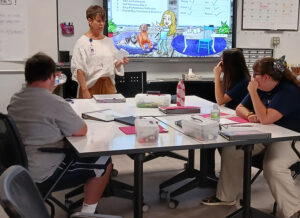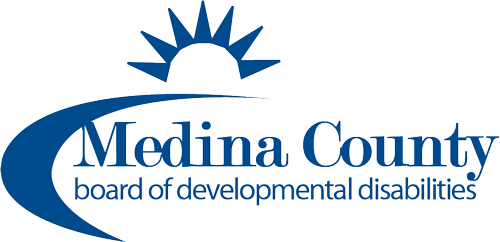Speak Up! Speak Out!

The Medina County Board of Developmental Disabilities (MCBDD) is helping people with developmental disabilities make their voices heard. The MCBDD has developed an Advocacy Curriculum and Training Project to help people with developmental disabilities learn the importance of having a voice in issues which impact them. The project highlights the key role advocacy plays with people with disabilities knowing their rights to take control of their own lives, speak up for themselves and have a part in their life decisions.
For many years, the MCBDD has directly worked one-on-one with groups of people with disabilities to teach, develop and increase their advocacy skills and abilities. Advocacy training helps people with disabilities to understand their rights, where to get information or advice, and how to express – both privately and publicly – their views, thoughts and concerns in areas that are important to them. “Fostering advocacy skills lays the ground work for people with disabilities to have their wishes genuinely considered and their voices heard to create positive changes in their world,” says Stacey Maleckar, MCBDD Superintendent.
In an effort to expand access to advocacy training throughout the community, the MCBDD developed the Advocacy Curriculum and Training Project. “The mission of this project is to increase the access people with developmental disabilities have to advocacy training and resources,” states Michelle Fortney, MCBDD Advocacy Coordinator. “We know advocacy training efforts thrive when they occur in groups within our community, as people with disabilities are strengthened in their abilities by the presence of others around them who share the same circumstances, concerns and causes.”
Through this project, the MCBDD offers a comprehensive 16-week advocacy group training program and technical assistance for individuals with developmental disabilities who are involved with other disability agencies and community organizations in Medina County. The Advocacy Curriculum and Training covers area such as general advocacy, communication styles, problem solving, rights and responsibilities, the Americans with Disabilities Act, setting goals, promoting community inclusion, and using community resources. The project is designed for participants to move through it at their own pace; depending on their own needs and interests. During the program, MCBDD staff assist individuals, agencies and organizations through on-site support, training facilitation and virtual meetings. The MCBDD involvement and assistance can be increased or decreased, based on the needs of each group and the agency or organization hosting the training. The MCBDD provides the materials needed for the training, including staff trainers, printable worksheets, resources, videos and recognition certificates for those who complete the training.
While the project was first piloted with a small group of local service agencies, it has since grown beyond and now includes schools and other organizations. By providing advocacy skills training in the community, the MCBDD Advocacy Curriculum and Training Project works to create a strong local support network of professionals, providers, families and support staff who can help people with developmental disabilities realize their own potential. “Helping people with developmental disabilities learn they do have a voice in their own lives and that their opinions do matter, is what this project is all about,” states Fortney. “It helps empower them to a have a place in creating a more inclusive community which sees and embraces the abilities of all its citizens.”
